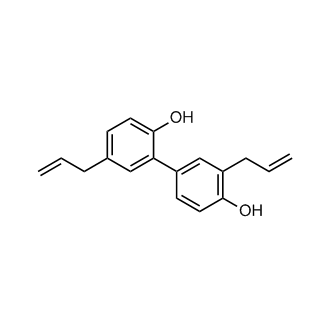| Size | Price | Stock |
|---|---|---|
| 50mg | $66 | In-stock |
| 100mg | $79 | In-stock |
| 200mg | $99 | In-stock |
| 500 mg | Get quote | |
| 1 g | Get quote | |
| We match the lowest price on market. | ||
We offer a substantial discount on larger orders, please inquire via [email protected]
or Fax: (86)21-58955996
Inquiry for price and availability only. Please place your order via our email or fax.
| Cat. No. : | HY-N0003 |
| M.Wt: | 266.33 |
| Formula: | C18H18O2 |
| Purity: | >98 % |
| Solubility: | DMSO : ≥ 50 mg/mL (187.74 mM) |
Honokiol is a bioactive, biphenolic phytochemical that possesses potent antioxidative, anti-inflammatory, antiangiogenic, and anticancer activities by targeting a variety of signaling molecules. It inhibits the activation of Akt. Honokiol can readily cross the blood brain barrier[1][2][3][4]. In Vitro: Honokiol (0, 12.5, 25 and 50 μM) inhibits the growth of GBM cells and induces apoptosis, with IC50 of appr against 30 μM DBTRG-05MG cell. Honokiol-induced apoptosis of GBM cells is associated with the downregulation of the Rb protein and cleavage of PARP and Bcl-x (S/L). Honokiol (50 μM) increases the level of autophagy markers in GBM cells[1]. Honokiol has anticancer effect, and the IC50 values with MDA-MB-231, MDA-MB-468, and MDA-MB-453 cell lines is 16.99 ± 1.28 μM, 15.94 ± 2.35 μM and 20.11 ±3.13 μM respectively. Honokiol (3, 10 μM) produces significant inhibition on the spheroid number and spheroid sizes in the clonogenic assay[2]. Honokiol (0.1-1.0 μM) specifically inhibits washed human platelet aggregation stimulated by collagen, but not by other agonists. honokiol (0.6 and 1.0 μM) can concentration-dependently inhibit the collagen-induced ATP-release reaction in washed human platelets. Honokiol specifically inhibits platelet aggregation and the phosphorylation of Lyn, PLCγ2, and PKC stimulated with convulxin. Honokiol (5, 10 μM) significantly inhibits convulxin-stimulated MAPKs and Akt activation[3]. In Vivo: Honokiol-NM (40 mg/kg, p.o.) produces superior anticancer effects, and the PCNA, Cyclin D1 and cleaved caspase 3 expressions are 2.12, 1.92 and 1.68-fold significantly altered in this treated group[2].
Lorem ipsum dolor sit amet, consectetur adipisicing elit. Autem earum hic iste maiores, nam neque rem suscipit. Adipisci consequatur error exercitationem fugit ipsam optio qui, quibusdam repellendus sed vero! Debitis.
Inquiry Information- Product Name:
- Honokiol
- Cat. No.:
- HY-N0003
- Quantity:


Your information is safe with us.